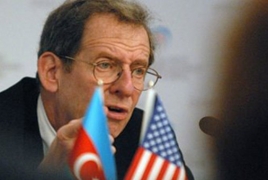Helsinki Commission slams Azerbaijan’s human rights violations November 6, 2015 - 14:12 AMT PanARMENIAN.Net - The U.S. Congressional Commission on Security and Cooperation in Europe, known as the Helsinki Commission, on Thursday, November 5, held a briefing with three prominent analysts and activists to examine the state of human rights violations in Azerbaijan, Contact.az reports. Titled “The Rule of Law and Civil Society in Azerbaijan,” the briefing covered such topics as crackdown against independent voices, election, freedoms and the overall functioning of the legislative and judicial branches. The briefing panel included Ambassador Richard Morningstar, former U.S. envoy to Baku from July 2012 to August 2014, who currently serves as a founding director of the Global Energy Center at Atlantic Council, a Washington-based think-tank. Other participants were Natalia Bourjaily, vice president on Eurasia at International Center for Not-for-Profit Law and Dinara Yunus, daughter of imprisoned human rights defenders Leyla and Arif Yunus. Congressman Robert Aderholt, Helsinki Commission Commissioner, also joined the briefing. Morningstar, who is often described as the most informed person in Washington on Azerbaijani elite and its inner circle, raised some eyebrows by posing serious questions over ongoing crackdown against rights defenders and civil society in the oil-rich country. “I just don't understand what the Azerbaijani government is getting from all these [crackdown],” he said during his first public speech on the topic since he left Baku last summer just days after the local authorities arrested L. Yunus, leading human rights defender. “Why is Yunus in jail? What does the Azerbaijani government gain from this [arrest], rather than strained relations with the West?’ Prior to his return to Washington last summer, Morningstar termed democracy and human rights issues as the “elephant in the room” for the relationship between Baku and Washington. In his speech, he called current situation “disappointing” for bilateral relations despite the fact that the two countries “have many common strategic interests.” Two major factors have been driving back Baku-Washington relations, he said: first is the human rights issues – “especially since October 2013 presidential election,” and second, “lack of progress” on Nagorno Karabakh peace resolution. “Baku believes the U.S. should take strong steps on the peace process,” he said. Addressing the audience, D. Yunus said her parents are being punished for their human rights work. “I don't want to be up here next time saying my parents have died,” she said. In her speech, Bourjaily said that civil liberties in Azerbaijan have worsened dramatically over the past few years and continue to deteriorate. She cited politically tinged prosecutions of political activists and the introduction of onerous laws targeting NGOs as examples of a broad crackdown on civil society. Azerbaijan is the only country in the world where foreign organizations have to register three times: first, register their office, second, get a government approval for their operations and third, register every single grant, sub-grant and every single change to the grant, she said. Authorities said a total of 192 Azerbaijani troops were killed and 511 were wounded during Azerbaijan’s offensive. In 2023, the Azerbaijani government will increase the country’s defense budget by more than 1.1 billion manats ($650 million). The bill, published on Monday, is designed to "eliminate the shortcomings of an unreasonably broad interpretation of the key concept of "compatriot". The earthquake caused a temporary blackout, damaged many buildings and closed a number of rural roads. Partner news |